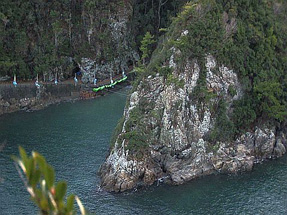Movie Review: The Cove
By Matthew Huntley
August 7, 2009
BoxOfficeProphets.com

What is his mission? O'Barry, now joined by members of the Oceanic Preservation Society (OPS), has been tirelessly fighting against the exploitation and captivity of dolphins since 1970. He started his career as the head trainer on Flipper, the 1960s television series about a father, his two sons and their pet dolphin (O'Barry actually lived in the house featured on the show). But after Kathy, the dolphin who played Flipper the most, died in his arms, he knew things had to change.
O'Barry is certain Kathy committed suicide because of the way she deliberately stayed above water. She finally succumbed to her own stress and unhappiness, something O'Barry says is hard to see with dolphins because they always look like they're smiling. Since that day, O'Barry has been looking to change the way dolphins are treated, and not just as means to his own absolution, but because it's the right thing to do.
The Cove primarily argues against dolphin captivity and mistreatment, but it also brings up points about human health and how ingesting dolphin meat, which is typically disguised as whale meat, puts people at risk because of its high levels of mercury. The film not only fights for the sake of animals, but also for ignorant humans, and it beseeches us to join the fight.
As it opens, we learn of a devastating and shameful practice taking place in Taiji, Japan. Here, for almost half the year, over 20,000 dolphins are driven in from the ocean and killed, often in brutal, inhumane ways. It turns out dolphins are a hot commodity around the world, mostly as performers, and businesses pay up to $150,000 for one of them. Of course, the Taiji police and local townspeople don't want anyone to see what goes on in the hidden cove where this massacre take place and the water is often red with blood, but that's where the filmmakers come in. The Cove is about their mission to expose this brutal practice and its ramifications in the political and business worlds.
This is not your typical documentary. It has the talking heads and archival footage, yes, but the filmmakers, headed by director Louie Psihoyos, craft it like a Hollywood thriller. This strategy works in the film's favor because, in many ways, it was a thrilling experience to capture the footage. Their plan and execution was like a real-life Ocean's Eleven as we see how the filmmakers recruited other activists and supporters from around the world to fulfill certain jobs, all as a means to make one big score. Some of those jobs included underwater sound recording; planting hidden cameras in artificial rocks; and arranging for quick getaways. Specialists of all kinds lent their special skills to the mission, from deep-sea divers to Hollywood special effects artists. Luckily, their efforts were worth it because the footage they acquire is unlike anything I've seen before (or ever care to see again). It is not easy to watch.
Plain and simple, The Cove is essential viewing. Its message is clear and convincing, while the footage speaks for itself. As a film and entertainment, it's incredibly powerful and educational, and I thought it ingenious for the filmmakers to shape it like a thriller, which makes the material more digestible for mainstream audiences, some of whom are still intimidated by documentaries. Because of its structure, the filmmakers are able to bring tension, emotion and knowledge to the floor. By the end, you'll likely be asking yourself how you can play a role in its cause. Wouldn't you like Ric O'Barry to finally cry tears of happiness?